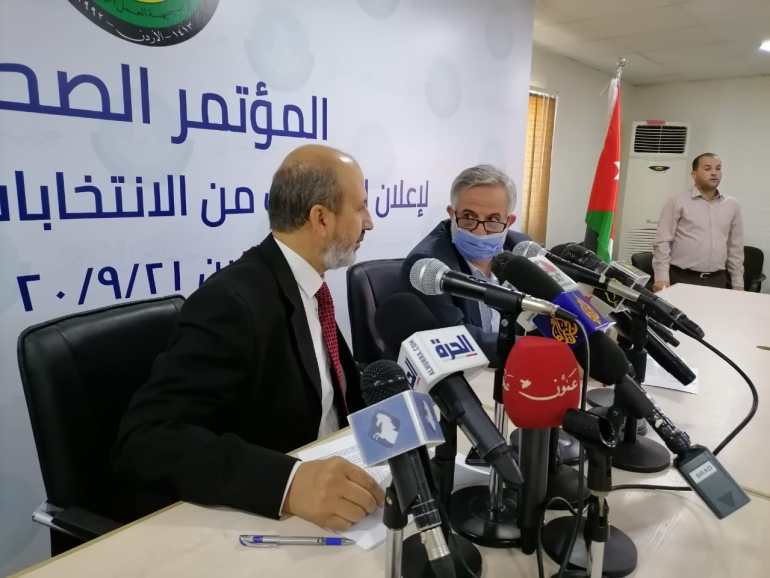After a sharp divergence of views, the Islamic Movement in Jordan, represented by the Muslim Brotherhood, and its political arm, the Islamic Action Front Party, decided to participate in the upcoming parliamentary elections on November 10, both as candidates and as ballots.
The decision to participate, announced by the party’s secretary general, Murad Al-Adaileh, this afternoon at a press conference, came after lengthy consultations in the leadership frameworks of the group and the party and their shura councils. The voice of those calling for boycotting the elections was the highest.
However, "giving priority to the national interest" was the master of the situation, according to the speakers.
Jordan will witness parliamentary elections on November 10, with the participation of all opposition parties except for one (Al-Jazeera Net)
In order to preserve the state’s institutions,
he declared in the press conference that the party’s participation in the upcoming parliamentary elections comes to preserve the state’s constitutional institutions in light of the programmed weakening it is facing.
To pass suspicious projects targeting Jordan in its national identity, and in a way that constitutes levers for inclusive national action and support fronts for the supreme national constants.
He added that the Islamic movement is exposed to clear targeting, and vigorous attempts to undermine it, due to its patriotic roles and its benevolent efforts, in a way that does not appeal to all abusers who believe that passing their suspicious projects can only be done by excluding the Islamic movement, with what it constitutes as a wall of blocking and an advanced defense front against all these projects. And in front of all those who dislike.
The Islamic Movement has participated in the parliamentary elections since the return of democratic life to Jordan in 1989, but its parliamentary process witnessed the boycott of the elections for several rounds.
But it was returning to participate and an active political presence under the dome of Parliament, according to observers.
Al-Adayleh: Our participation in the upcoming parliamentary elections comes to preserve the country's constitutional institutions (Al-Jazeera Net)
Tampered with the elections
Islamic Action warned unnamed parties against "tampering with the electoral process."
Because any negative practices may affect its integrity and integrity, and so that these elections do not become a burden on the state and society.
Al-Adayleh added that the absence of the Islamic movement from Parliament is a withdrawal from that battle, which targets Jordan and its national forces, especially the Islamic movement, and also realization of the wishes of those who are bent on clearing the arena for them.
For them to leave homelands to pass their suspicious projects.
The party feels - according to Al-Adaileh - that Jordan is exposed to a programmed weakening of state institutions, in light of challenges that are the most difficult in our Arab and regional surroundings, and that our patriotism requires us to work with all our sincere efforts to preserve state institutions and their stability in the face of all difficulties.
The participation of Islamists in the electoral process will be through an inclusive national coalition called the "National Alliance for Reform" that includes leaders from the Islamic movement, compatible national figures and the Islamic Movement for Reform program, tribal figures and youth, and representatives of the Circassians, Chechens and Christians quota within the electoral districts for which they are candidates in Amman and the major governorates, According to Al-Adaileh's talk to Al-Jazeera Net.
A number of female candidates will participate on the lists of the Islamist movement on the quota seats reserved for women, and women within the Islamist alliance are not restricted to female party members who are among the organizational cadres only.
Rather, the door is opened to women who are compatible and the National Alliance for Reform program.
According to the Jordanian election law, elections are held on the basis of national lists at the level of the Kingdom’s governorates, and electoral districts in the major governorates according to the open proportional list system. In forming the list, the number must not be less than 3 candidates, and individual candidacy for elections is not allowed.
The elections will take place on the basis of national lists at the level of the Kingdom's governorates (Al-Jazeera Net)
A simple majority The
decision to participate in the parliamentary elections came with a simple majority - according to a source in the movement - as a result of the general trend to boycott the parliamentary elections, with candidacy and voting, for several reasons, the most important of which is the pressure on freedom of expression in Jordan, the tightening of the security grip on the party and its working cadres, and the low ceiling of public freedoms, And the official encroachment on the rights of Jordanians guaranteed by the constitution, in addition to the crisis of the teachers union, the difficult living conditions for Jordanians, the recession that the Jordanian economy is going through, and the rapid increase in debt.
Al-Adayleh spoke of pressures and threats by security services - he did not name them - against the sons of the Islamic movement, its candidates and supporters of national and tribal figures.
Which drives candidates to refrain from running.
He called for lifting the security grip on the candidates and the blocs, because of their negative impact on the results of the elections before they are held, adding that any tampering with the elections threatens the security and stability of the Kingdom in light of external pressure and popular pressure, and any tampering with the elections means a popular explosion that has no consequences.
With the Islamic Action Front announcing its participation in the elections, the Islamic, leftist, and nationalist opposition political parties and the centrist parties have announced their participation in the elections, and only the Jordanian Partnership and Salvation Party announced boycotting the elections.
Although there are about 54 licensed political parties in Jordan;
However, parliamentary elections are still taking place on tribal, regional and geographic lines, without real political programs.

